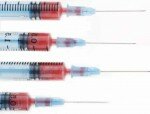Overview
While annual physical examinations by your veterinarian are critically important for the health of your animal, there is growing concern about giving annual vaccines. In my opinion, the best approach to vaccination is to build up the health of animals so they are not susceptible to acute infectious diseases (therefore do not need vaccines). Some dogs and cats will become severely ill even with the very first vaccines, so before vaccinating, be sure they are as healthy as possible. Vaccines for viral diseases such as dog or cat distemper (panleukopenia) and Parvo provide lifetime immunity if they provide any at all. The other vaccines either provide little immunity, short lived immunity, or do not even cover the local disease. Even Rabies vaccine protects for life but I do recommend following your legal requirements unless you are working with an integrative veterinarian who is recommending less frequently.
When giving vaccines, realize there can be serious side effects. Do no give multiple ones at a time. Take steps to prevent reactions and carefully continue to evaluate health after the vaccine(using the Early Warning Signs) . If health does suffer, treat holistically as soon as problems are noticed.








 Potent adjuvanted killed vaccines like those for rabies virus also can trigger immediate and delayed (vaccinosis) adverse vaccine reactions. Genetic predisposition to these disorders in humans has been linked to the leucocyte antigen D-related gene locus of the major histocompatibility complex, and is likely to have parallel associations in domestic animals.
Potent adjuvanted killed vaccines like those for rabies virus also can trigger immediate and delayed (vaccinosis) adverse vaccine reactions. Genetic predisposition to these disorders in humans has been linked to the leucocyte antigen D-related gene locus of the major histocompatibility complex, and is likely to have parallel associations in domestic animals.